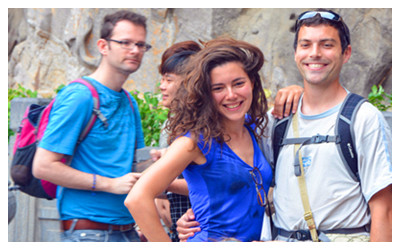Skype: neodalle-travel
Tel: +86 135 7447 2266
E-mail: sales@visitaroundchina.com
 There were seven ancient capitals in China, three of which were located in Henan: Luoyang, Kaifeng and Anyang. This province has more historical relics than any other province. Henan has the most underground historical sites in China; only one other province has more above-ground historical sites than Henan, and one-eighth of all historical relics in museums in China are in Henan. In Henan Museum alone there are 120,000 historical relics, including over 40,000 rare ones. Henan is a perfect place for tourists to see the past.
There were seven ancient capitals in China, three of which were located in Henan: Luoyang, Kaifeng and Anyang. This province has more historical relics than any other province. Henan has the most underground historical sites in China; only one other province has more above-ground historical sites than Henan, and one-eighth of all historical relics in museums in China are in Henan. In Henan Museum alone there are 120,000 historical relics, including over 40,000 rare ones. Henan is a perfect place for tourists to see the past.
Climate & weather
With vast plains and moderate climate, Henan is an important national base for farm and livestock production. The arable land of the province totals 8,110,300 hectares, including a cultivated land of 7,262,800 hectares, accounting for 6.24% of that of the whole nation and ranks the fourth, only next to Heilongjiang, Sichuan and Inner Mongolia.
Henan is located in the transition belt from the subtropical zone to the temperate zone. It has a mild climate with an annual average temperature of 15.5℃-9.5℃ from south to north, a moderate annual rainfall of 1380.6-526.0 millimeters, and a frost-free period of 265-332 days. Therefore, Henan is suitable for the growth of various crops and it is one of the main national bases for all kinds of farm crops such as wheat, corn, cotton, tobacco leaf, legume, and sesame.
The grain yield of the province amounts to one tenth of the national total. The oil crops yield and the beef output are both one seventh of the national total and the cotton yield is one sixth. Henan takes the lead in its yield of farm products including wheat, corn, cotton, tobacco leaf, legume, and sesame, as well as livestock products like meat, eggs and dairy.
Henan also boasts a good number of famous, superior and special local products, such as Yuanyang rice; Kaifeng watermelon, Xixia kiwi fruits, Lingbao apples, Ningling pears and Xinyang chestnut; Zhongmu and Qixian garlic, Yongcheng green peppers; Luoyang peony, Yanling flowers. In addition, the well known Maojian tea and traditional Chinese herb medicines are also produced here.
What cautions should tourists take when visit temples?
1. No sun-glasses in the Buddhist temple;
2. No photo for the Buddha;
3. Visit the temple clock-wisely from the left to right;
4. Do not step upon the threshold when enter the temple.
5. Palms together showing your respect to the Buddhist monk and Buddha.
Local Flavors in Henan
There are many local flavors in Henan. If your time is limited, you are recommended to taste Xiaoji noodle in Zhengzhou city, Kaifeng baozi and water banquet in Luoyang. You will not be disappointed.
Local souvenirs in Henan
The recommended souvenirs are Shaolin Sword in Dengfeng, Zhengzhou city, the trio-colored glazed pottery of the Tang Dynasty in Luoyang, the New Year pictures of Zhuxian Town, Kaifeng city and others.
 Ask Questions ?
Ask Questions ?